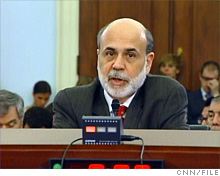E-mail shows Fed strong-armed BofA
A day before Bank of America CEO Ken Lewis is due on Capitol Hill, e-mails detail the pressure the Fed put on BofA to complete its merger with Merrill Lynch.
 |
| New emails add more insight into heated Bank of America and Merrill Lynch merger talks |
WASHINGTON (CNNMoney.com) -- Bank of America CEO Ken Lewis heads to Capitol Hill on Thursday, and he's likely to be grilled by lawmakers about the government's role in ensuring that the bank complete its controversial merger with Merrill Lynch.
According to e-mails released Wednesday that pull back the curtain on heated negotiations, Federal Reserve Chairman Ben Bernanke had suggested to another Fed official that "management is gone," if BofA managers tried to flee the deal and later on needed further government assistance.
The revelations come thanks to congressional subpoenas demanding that the Fed disclose e-mails related to Bank of America's purchase of Merrill. CNNMoney.com acquired copies of some of the e-mails circulated among House Republicans late Wednesday.
Lewis is the sole witness of a House Committee on Oversight and Government Reform hearing Thursday about the BofA-Merrill deal titled "Bank of America and Merrill Lynch: How Did a Private Deal Turn into a Federal Bailout?"
He is expected to be asked specifically about whether the Federal Reserve and other government officials pressured Bank of America (BAC, Fortune 500) into completing the merger even after BofA realized how badly Merrill Lynch's fourth-quarter losses would be.
The BofA-Merrill Lynch deal was valued at $50 billion when it was announced in mid-September -- the same day that Lehman Brothers declared bankruptcy. But the deal's worth dropped to $19 billion after Bank of America's shares plunged in following months.
Regulators eventually agreed to give BofA $20 billion in new capital and $118 billion in asset guarantees to cover possible losses tied to the transaction.
Lewis told investigators in the New York Attorney General's office earlier this year that he felt his job was on the line if he didn't go through with the deal. Once Lewis learned last December of Merrill Lynch's deterioration, he told then Treasury Secretary Henry Paulson that BofA was considering backing out of the deal, according to his testimony to investigators.
Paulson said that Lewis and the BofA board would be replaced if they sought to end the merger, which Paulson viewed as integral to the health of the U.S. financial system. Paulson told New York investigators that he threatened Lewis' job at the behest of Fed chief Ben Bernanke.
According to a Dec. 21 e-mail released Wednesday, Bernanke called BofA's threat to pull out of the deal a "bargaining chip," saying "we do not see it as a very likely scenario."
In another e-mail, Federal Reserve Bank of Richmond President Jeffrey Lacker said that Bernanke considered Bank of America's threat to pull out "irrelevant" and "not credible."
Lacker added that Bernanke "also intends to make clear that if they play that card and they need assistance, management is gone," Lacker wrote. BofA is based in Charlotte, N.C., which is in Lacker's district.
The series of e-mails and other documents released Wednesday also called into question the notion that Merrill Lynch's last hope laid with the BofA deal. It appeared that the Fed was willing to provide support to Merrill in order to avoid another collapse like Lehman Brothers.
In one document that listed contingency plans for Merrill if BofA decided to abandon the merger, the Fed said that there were "emergency liquidity provision actions that could be taken to provide some time for the sale/disposition of [Merrill Lynch] businesses and assets."
A Federal Reserve spokeswoman declined to comment on the e-mails.
Bank of America spokesman Lawrence Di Rita said that while he wouldn't comment on internal documents he hasn't seen, he pointed out the unusually tense and crisis-mode environment that overshadowed the negotiations.
"Stepping back, though, it is important to remember the circumstances in which these discussions were taking place: a crisis in financial markets and in the economy generally," Di Rita said. "Serious people were working hard to make decisions to stabilize and improve the situation. In hindsight, it's interesting to look at all of that, but we're looking forward."
CNN Congressional correspondent Brianna Keilar contributed to this report. ![]()

